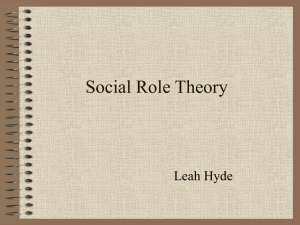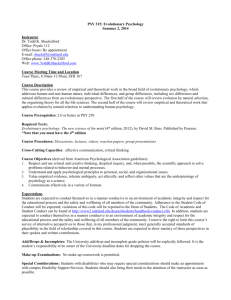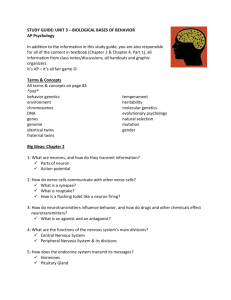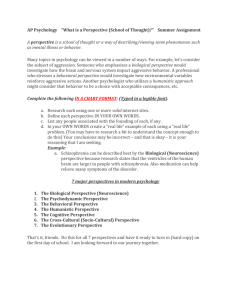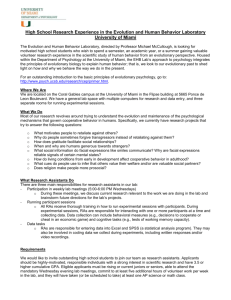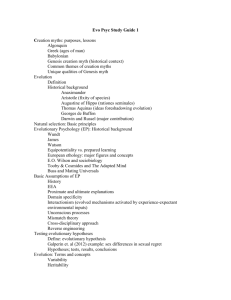Evolutionary Psychology
advertisement
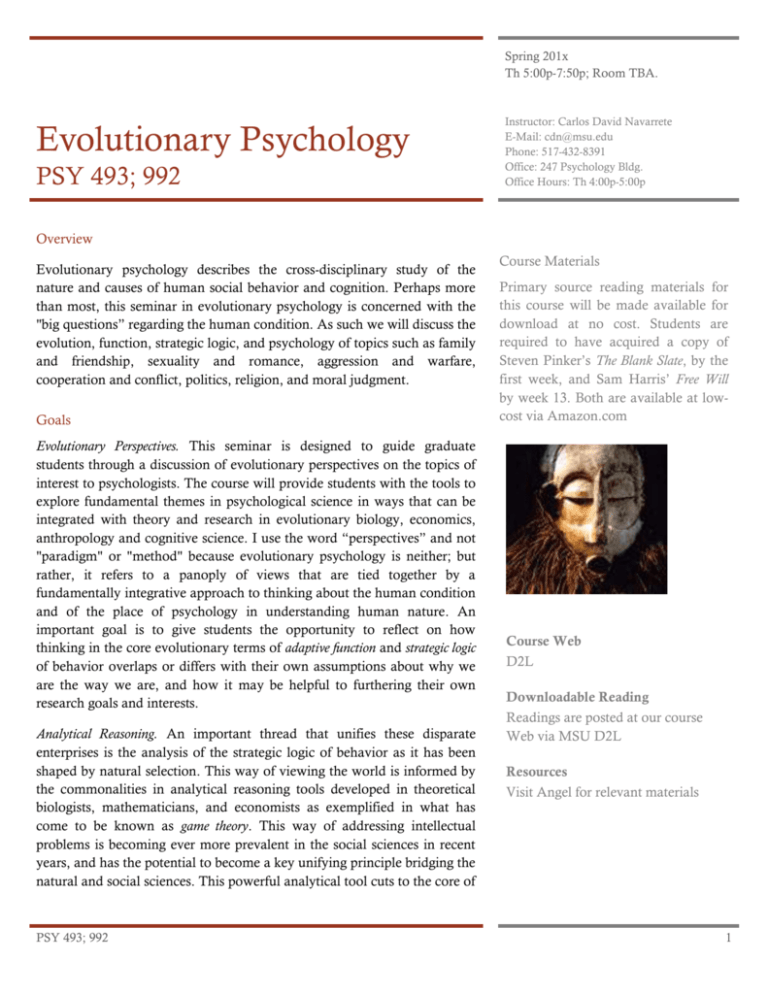
Spring 201x Th 5:00p-7:50p; Room TBA. Evolutionary Psychology PSY 493; 992 Instructor: Carlos David Navarrete E-Mail: cdn@msu.edu Phone: 517-432-8391 Office: 247 Psychology Bldg. Office Hours: Th 4:00p-5:00p Overview Evolutionary psychology describes the cross-disciplinary study of the nature and causes of human social behavior and cognition. Perhaps more than most, this seminar in evolutionary psychology is concerned with the "big questions” regarding the human condition. As such we will discuss the evolution, function, strategic logic, and psychology of topics such as family and friendship, sexuality and romance, aggression and warfare, cooperation and conflict, politics, religion, and moral judgment. Goals Evolutionary Perspectives. This seminar is designed to guide graduate students through a discussion of evolutionary perspectives on the topics of interest to psychologists. The course will provide students with the tools to explore fundamental themes in psychological science in ways that can be integrated with theory and research in evolutionary biology, economics, anthropology and cognitive science. I use the word “perspectives” and not "paradigm" or "method" because evolutionary psychology is neither; but rather, it refers to a panoply of views that are tied together by a fundamentally integrative approach to thinking about the human condition and of the place of psychology in understanding human nature. An important goal is to give students the opportunity to reflect on how thinking in the core evolutionary terms of adaptive function and strategic logic of behavior overlaps or differs with their own assumptions about why we are the way we are, and how it may be helpful to furthering their own research goals and interests. Analytical Reasoning. An important thread that unifies these disparate enterprises is the analysis of the strategic logic of behavior as it has been shaped by natural selection. This way of viewing the world is informed by the commonalities in analytical reasoning tools developed in theoretical biologists, mathematicians, and economists as exemplified in what has come to be known as game theory. This way of addressing intellectual problems is becoming ever more prevalent in the social sciences in recent years, and has the potential to become a key unifying principle bridging the natural and social sciences. This powerful analytical tool cuts to the core of PSY 493; 992 Course Materials Primary source reading materials for this course will be made available for download at no cost. Students are required to have acquired a copy of Steven Pinker’s The Blank Slate, by the first week, and Sam Harris’ Free Will by week 13. Both are available at lowcost via Amazon.com Course Web D2L Downloadable Reading Readings are posted at our course Web via MSU D2L Resources Visit Angel for relevant materials 1 the fundamental nature of humanity, and has the potential to synthesize various ways of thinking about the world into a coherent network of concepts, with the potential to be as intellectually satisfying as any explanation of the natural phenomena coming from physics or chemistry. What Students Get. Students will be challenged to reflect on the way they conduct their own research in their specific areas in terms of broader “why” questions, and how the perspectives discussed during seminars can be integrated (or not) with their own working assumptions about why we are the way we are. Although practical applications are an important component of the seminar, the ultimate goal of this course, it might be argued, is to be as helpful as possible to providing students the exposure to the ideas for building a meta-theoretical framework for framing their own research goals and aspirations. Evaluation Grading evaluation is based on a midterm exam (15%), class participation (40%), game theory exercises (25%) and a writing assignment (20%). Exam & Term Paper The midterm is a 12-item written "take-home" exam on the 10th week. Graduate Students: The final term paper will be on a specific area relevant to your own research interests. The paper will be written as a research proposal designed to test hypotheses that are informed by an evolutionary perspective. The paper should be written in the format of your discipline, and range from 8-12 double-spaced pages (excluding references). Undergraduate Students: The term paper is a set of two essays that analyze two different films. Film list and details TBA. Class Participation Meetings are structured such that your instructor provides a lecture for the first half of each meeting, and students participate via clickers and discussion. In the second half of each meeting, students lead discussion of the readings. Each week, one to three students will serve as a “defense team,” presenting the arguments and evidence for them while highlighting the strengths the perspectives provided in the readings. One-to-three students serve as a “prosecution team,” and raise concerns regarding weaknesses and problems with the readings. Through this dialectic, students critically evaluate the logic, clarity, and evidence for theories and hypotheses within evolutionary psychology, allow for the mutually reinforcement of the learning of the principles necessary for engagement in the social science enterprise, suggest ways in which the readings’ arguments could be made stronger or the arguments and evidence presented can be made more cogent. PSY 493; 992 2 In addition, students not serving on the prosecution or defense teams for that week’s readings are required to submit one or two paragraphs of their thoughts or initial impressions on this readings at least 24-hours before each class meeting. The purpose of this exercise is to further encourage class discussion and critical thinking about the readings. Student may be asked to elaborate on his or her discussion thoughts/impressions with the class. Game Theory Exercises There are bi-weekly homework assignments to help us through basic concepts in game theory. These assignments are designed not for diagnostic purposes, but for development of critical thinking and analytical reasoning skills relevant to the topics under discussion. No formal mathematical training above the level of elementary algebra is required. Reading Schedule Foundations of an Evolutionary Psychology Week 1 Week 2 Week 3 Week 4 Week 5 Week 6 The Blank Slate I The Blank Slate II Kin Group Cooperation Reciprocity and Cooperation Parental Investment and Sexual Selection Prepared Learning and the Modularity of Mind The Emergence of our Evolved Psychology Week 7 Week 8 Week 9 Week 10 Infant Development of Functional Biases Midterm Exam Personality and Life History Personality and Behavioral Genetics Probing the Human Condition Week 11 Week 12 Week 13 Week 14 Week 15 Adaptive Decision-Making and Evolutionary Economics Intergroup Conflict Morality I: Harm and Justice Morality II: Politics, Religion and Moral Condemnation Consciousness and Free Will Finals Week: Term Paper Due PSY 493; 992 3 READINGS: Weeks 1 and 2 – The Blank Slate Pinker, S. (2002). The Blank Slate. The Modern Denial of Human Nature. Parts 1-3. Week 3 – Kin group Cooperation Hamilton, W.D. (1963). The evolution of altruistic behavior. The American Naturalist, 97(896): 354-356. Dawkins, R. (1979). Twelve misunderstanding of kin selection. Zeitschrift für Tierpsychologie, 51, 184—200. Trivers, R. (1974). Parent-offspring conflict. American Zoologist, 14: 249-264. Lieberman, D.,Tooby,J., & Cosmides, L. (1997). The architecture of human kin detection. Nature, 445: 727-731. DeBruine, L. (2005). Trustworthy but not lust-worthy: context-specific effects of facial resemblance. Proc. R. Soc. B. 272, 919–922. Week 4 – Reciprocity and Cooperation Axelrod, R. & Hamilton, W.D. The evolution of cooperation, Science, 211(4489):1390-1396. Trivers, R. (1971). The evolution of reciprocal altruism. Quarterly Review of Biology, 46: 35-57. Dugatkin,L. (1997). The Evolution of Cooperation. BioScience, 47(6): 355-362. Fehr, E., & Gachter, S. Altruistic punishment in humans. Nature, 415, 137-140. Pinker, 2002; Ch. 14. Week 5 – Parental Investment and Sexual Selection Trivers, R. L. (1972). Parental investment and sexual selection. In B. Campbell (Ed.) Sexual selection and the descent of man, 1871-1971 (pp 136–179). Chicago, Aldine. Haselton, M.G. & Buss, D.M. (2000). Error management theory: A new perspective on biases in cross-sex mind reading. Journal of Personality and Social Psychology, 78(1): 81-91. Gangestad, S., Garver-Apgar, C., Simpson, J., & Cousin, A. (2007). Changes in women’s mate preferences across the ovulatory cycle. Journal of Personality & Social Psychology, 92(1): 151-163. Buss, D. & Schmitt, D. (1993). Sexual Strategies Theory: An evolutionary perspective on human mating. Psychological Review, 100(2), 204-232. Pinker, S. (2002). The Blank Slate. Ch. 18. Week 6 – Prepared Learning and the Modularity of Mind Ohman, A. & Mineka, S. (2001). Fears, phobias, and preparedness: toward an evolved module of fear and fear learning. Psychological Review, 108(3):483–522. Garcia, J. & Koelling, R. (1966). Relation of cue to consequence in avoidance learning. Psychonomic Science, 4: 123-124. Seligman, Martin (1971). Phobias and preparedness. Behavior Therapy, 2: 307–321. Tooby, J. & Cosmides, L. (1992). The psychological foundations of culture. In J. Barkow, L. Cosmides, & J. Tooby (Eds.), The adapted mind: Evolutionary psychology and the generation of culture. New York: Oxford University Press. Week 7 - Infant Development and Functional Biases Hamlin, J., Wynn, K., & Bloom, P. (2007). Social evaluation by preverbal infants. Nature, 450, 557-559. Hamlin, J., Wynn, K., Bloom, P., & Mahajan, N. (2011). How infants and toddlers react to antisocial others. Proceedings of the National Academy of Science, 108(50), 19931–19936. Wynn, K. (2008). Some innate foundations of social and moral cognition. In P. Carruthers, S. Laurence & S. Stich (Eds.), The Innate Mind: Foundations and the Future. Oxford: Oxford University Press. Wertz, A.E., & Wynn., K. (2014). Thyme to touch: Infants possess strategies that protect them PSY 493; 992 4 from dangers posed by plants. Cognition, 130, 44-49. Wertz, A.E., & German, T.C. (2013). Theory of mind in the wild: Toward tackling the challenges of everyday mental state reasoning. PLoS ONE, 8(9), e72835 Week 8 – Personality and Life History Belsky, J., Steinberg, L., Draper, P. (1991). Childhood experience, interpersonal development, and reproductive strategy: An evolutionary theory of socialization. Child Development, 62(4): 647-670 Kaplan, H. & Gangestad, S. Life History Theory and Evolutionary Psychology. In The Handbook of Evolutionary Psychology. David M. Buss (ed). John Wiley and Sons: pp 68-95. Buss, D. (2009). How can evolutionary psychology explain personality and individual differences? Perspectives in Psychological Science, 4: 359-366. Gosling, S.D. & John, O.P. (1999). Personality dimensions in non-human animals: A cross-species review. Current Directions in Psychological Science, 69-75. Week 9 – Personality and Behavioral Genetics Keller, M., Howrigan, D., & Simonson, M. (2011). Theory and methods in evolutionary behavioral genetics. In The Evolution of Personality and Individual Differences. Edited by Buss, D. & Hawley, P. Oxford University Press: New York. pp. 280-302. Schmitt, D., Realo, A., Voracek, M., & Allik, J. (2008). Why can’t a man be more like a woman? Sex difference in personality traits across 55 cultures. Journal of Personality and Social Psychology, 94, 168-192. Kaufman, S., DeYoung, C., Reis, D., & Gray, J. (2011). General intelligence predicts reasoning ability even for evolutionarily familiar content Relation of cue to consequence in avoidance learning. Intelligence, 39, 311-322. Segal, N. (2011). Twin, adoption and family methods as approaches to the evolution of individual differences. In In The Evolution of Personality and Individual Differences. Edited by Buss, D. & Hawley, P. Oxford University Press: New York. pp. 303-337. Week 10 – Midterm Exam 12 item “take-home” midterm Week 11 - Adaptive Decisions and Evolutionary Economics Sperber, D. (2013). A mutualistic approach to morality: The evolution of fairness by partner choice. Behavioral and Brain Sciences, 36, 59–122 DeScioli, P. (2013). Does market competition explain fairness? Comment on “A mutualistic approach to morality.” Behavioral and Brain Sciences, 36, 87-88. Kenrick, D.T., Griskevicius, V., Sundie, J.M., Li, N.P., Li. Y.J., & Neuberg, S.L. (2009). Deep rationality: The evolutionary economics of decision making. Social Cognition, 27, 764-785. Gigerenzer, G. (2008). Why heuristics work. Perspectives on Psychological Science, 3(1), 20-29. olyanatz, A., Cardenas, J. C., Gurven, M., Gwako, E., Henrich, N., Lesorogol, C., Marlowe, F., Tracer, D., & J. Ziker (2010) Markets, Religion, Community Size, and the Evolution of Fairness and Punishment. Science 327: 1480-1484. Week 12 – Intergroup Conflict Philosophical Transactions of the Royal Society of London B, 366, 3466-3477. tem (and why it matters). Current Directions in Psychological Science, 20(2) ,99-103. group male target hypothesis. Journal of Personality & Social Psychology, 98(6): 933-45. “warrior male” hypothesis. Philosophical Transactions of the Royal Society B: Biological Sciences, 367(1589): 670-679. PSY 493; 992 5 Week 13 – Morality I Pinker, 2002. Ch. 15: “The Sanctimonious Animal.” Pinker, 2011, NYTimes Article: “The Moral Instinct” Haidt, J. (2007). The new synthesis in moral psychology. Science, 316: 998-1002. Greene, J., Sommerville, R.B., Nystrom, L., Darley, J., Cohen, J. (2001). An fMRI Investigation of Emotional Engagement in Moral Judgment. Science, 293: 2105-2108. Hauser, M., Cushman, F., Young, L., Jin, K., Mikhail, J. (2007). A Dissociation Between Moral Judgments and Justifications. Mind & Language, 22: 1-22. Week 14 – Morality II Pinker, 2002. Ch. 16: “Politics.” Haidt, J. (2007). The new synthesis in moral psychology. Science, 316: 998-1002. Boyer, P. (2008). Religion: Bound to believe? Nature, 455: 1038-1039. DeScioli, P., & Kurzban, R. (2013). A solution to the mysteries of morality. Psychological Bulletin, 139, 477-496. Kurzban, R., DeScioli, P., & Fein, D. (2012). Hamilton vs. Kant: Pitting adaptations for altruism against adaptations for moral judgment. Evolution and Human Behavior, 33, 323-333 Week 15 – Consciousness and Free Will Dennett, D. (1998). The evolution of consciousness. In The Reality Club, Prentice Hall. Pp-3-99. Dennett, D. (1984). Elbow room: The varieties of free will worth wanting. MIT Press. Chs. 6-7. Harris, S. (2012). Free will. Simon & Schuster: New York. PSY 493; 992 6

